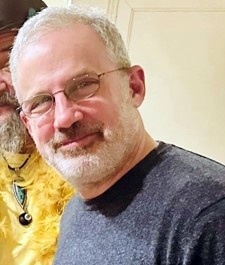Columbia College | Columbia University in the City of New York
“There Was Never Any Doubt Where I Was Going”

What were you like when you arrived at Columbia?
I was a wide-eyed theater geek from Upstate New York. I read the Arts & Leisure section, performed on the high school drama team, and wore out soundtrack albums of rock musicals like Grease, Hair and The Rocky Horror Picture Show. During my senior year, I joined a field trip sponsored by the local B’nai B’rith chapter to see Beatlemania in the city. An accident on the West Side Highway forced the bus driver to take Broadway to the bridge after the show. At the stoplight at 116th Street I peered out the window; outside the open Gates, people were passing out flyers, coming and going with books and backpacks, caught up in conversations I couldn’t hear but wanted to be part of. I was as surprised as anyone when I got in; there was never any doubt where I was going.
What do you remember about your first-year living situation?
I lived on the third floor of Carman Hall, the Brutalist cinder-block tower that housed first-years. We played soccer with a rubber ball in the hallway and watched reruns of old sitcoms in the common area. My suite faced 114th Street, and on hot September nights when we had to keep the windows open, gaggles of drunken upperclassmen would stand outside and serenade us with R-rated versions of popular songs. Dormitory living was fairly desultory until junior year, when we managed to snag one of the spacious suites on River Hall’s ground floor, with an eat-in kitchen where we subsisted on cheese dogs, chicken livers, Café Bustelo and the occasional pastrami Reuben from Mama Joy’s.
What Core class or experience do you most remember, and why?
Freshmen had to register for classes in person then, and the night before registration opened, the serious ones camped out in front of the gym like concertgoers to be first in line. A storm that night nearly blew away the few provisions I’d brought. By the time I got to register, Wallace Gray’s section of Literature Humanities was full so I went with Werner Sollors, who was also well reviewed in the student-generated course catalog that made the rounds. Sollors was as lively a classroom presence as I’d ever encountered. Too transfixed to take notes, I was constantly raising my hand, often prefacing my comments with “I didn’t finish the reading, but …” while classmates groaned into their shirt collars.
Knowing nothing of academia, I was unaware that my professors had complementary careers as writers and scholars. Decades later I’d come across Sollors’ monumental A New Literary History of America, co-edited with Greil Marcus, the critic who made me want to write about music. But in 1979, Sollors was an assistant professor at Columbia, and I got to learn about Homer and Aeschylus and Virgil from him. That December, my dad had business in the city and stopped by campus to check my grades, which were posted outside the Registrar’s office by the last four digits of Social Security numbers. When he told me I got the only A in Sollors’ class he looked as proud as I felt. I tell my first-year classes there’s a moment when you’ll go from playing the role of a college student outwardly to feeling it inwardly … that was it for me.
Did you have a favorite spot on campus, and what did you like about it?
There were many. The smoking room on the second floor of Butler library, where I puffed Sobranie Black Russians, read the London Review of Books and cultivated a musty Anglophilia that was still vaguely fashionable. The Postcrypt Coffeehouse in the basement of St. Paul’s Chapel, run by my friend (everyone’s friend) Ted Kesler ’83, where I caught a lot of great music and did a few readings. The Mill, our favorite of the half dozen greasy spoons that graced Broadway between 110th and 116th Streets. The fire escape outside River Hall. The Alpha Delta Phi fraternity house, where I met my wife. The bench in Riverside Park where, as a senior, I watched the sunset and learned to live with it.
What, if anything, about your college experience would you do over?
I was an English major but took a couple of computer science classes for kicks my senior year: “Intro to Pascal Programming,” followed by something called “Fundamental Algorithms.” Finding myself on the cusp between a B+ and an A- in the latter class, I went to chat with the professor. At the time I was selling mechanical mice at street fairs for pocket money. The mechanism consisted of a spool wound with string and run through the center with a rubber band; this was attached to a wire frame covered with a gray foam shell, so that when you bobbed the string up and down through a hole in the foam, the thing would scurry around the sidewalk. They couldn’t have cost more than a few cents to produce; I bought them from an old high school friend for $1.00 apiece and sold them for $3.00. If you caught only a sidelong glimpse of one, it really looked like a mouse; people would jump, and then stand there rapt.
The Algorithms instructor was an adjunct, a young Russian guy with a sense of humor and a tiny office in the basement of Mudd Hall. After some haggling, he asked what was in my bag. I pulled out one of my little friends. He asked me how it worked, and I showed him. Minutes later I walked out into the sunlight with my A- and one less mechanical mouse.
In retrospect, sometimes I wish I’d stuck with that computer stuff.
More “Take Five”
- 1 of 32
- ›

